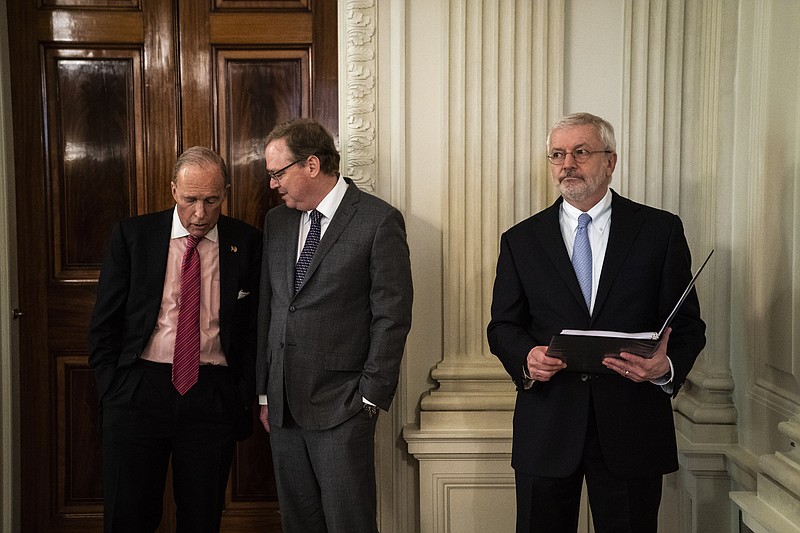WASHINGTON -- The Trump administration is facing an exodus of at least a handful of senior economic officials even as the economy remains in one of its most turbulent periods in decades.
Bimal Patel, a top deputy to Treasury Secretary Steven Mnuchin, is departing the administration, according to three people familiar with the matter who spoke on the condition of anonymity. Patel, who will leave at the end of this week, has played a key role in overseeing the administration's $500 billion small-business rescue program and has helped lead the Treasury Department's efforts related to the banking system.
He is the third senior economic adviser in the past week to signal plans to leave the administration, and others have left their roles in the past month. Patel was sworn in to the Treasury Department post in June 2019.
Patel's planned exit comes as the financial system faces growing signs that many homeowners may not pay their mortgages and that some companies may declare bankruptcy or tap out their credit lines.
It's a precarious moment for the U.S. economy, with a spike in coronavirus cases threatening to stall a business resurgence and with large amounts of federal stimulus aid expiring. The departures come roughly five months before the 2020 presidential election; senior officials typically face pressure to stay on through Election Day.
Over the past month, the White House has also announced the departures of Andrew Olmem, who was deputy director of the White House National Economic Council; Eric Ueland, who served as the White House director of legislative affairs and played a key role in negotiations with Congress over stimulus funding; Kevin Hassett, who was a senior White House economic official; and Tomas Philipson, who served as acting chairman of the White House Council of Economic Advisers.
"Patel's departure is concerning because there is still risk to the financial system, although it's diminished over the last several months," said Ernie Tedeschi, a former Obama administration economist. He noted the financial system is in better shape now because of the actions taken by the Federal Reserve and the Treasury Department.
But "it's not 'mission accomplished' yet," Tedeschi said.
The departures add an additional set of challenges to the administration's daunting task of stabilizing the economy. President Donald Trump and senior officials have promised a swift rebound as public health restrictions are relaxed, but the country faces a spike in coronavirus cases and persistently high unemployment claims.
Larry Kudlow, the president's top economic adviser, expressed confidence in a rapid economic recovery, saying Monday that "the overwhelming evidence is that we're in V-shaped recovery."
Kudlow also said news of the administration's economic departures amounted to "gossip" and that The Washington Post's reporting about the departures was "inaccurate." A White House spokesman did not return requests for clarification about Kudlow's comments.
"Not only do we have a solid staff, Steve Mnuchin is still at Treasury; I'm still at the NEC [National Economic Council]; we can call Kevin Hassett whenever we want," Kudlow told reporters. "CEA staff is doing a great job under Tyler Goodbody," Kudlow added, an apparent reference to Tyler Goodspeed of the Council of Economic Advisers.
White House officials have said the departures don't reflect dissatisfaction with working for the administration or a pessimistic outlook about the 2020 election. Hassett, who left the White House in 2019 but returned earlier this year, has said he was always planning to return for a short time to help with the worst part of the pandemic. Olmem started at the beginning of the administration and has already been replaced by longtime White House policy adviser Francis Brooke.
Philipson clashed with administration officials during his tenure and did not have a strong working relationship with the president or a major role in crafting economic policy, officials have said. The White House Council of Economic Advisers will probably have a greater role in forming administration policy now that Philipson has departed, according to one person familiar with internal administration matters who spoke on the condition of anonymity to talk candidly. Philipson did not return requests for comment.
Bill Hoagland, senior vice president at the Bipartisan Policy Center and former Republican staff director for the Senate Budget Committee, said he has talked to several White House economic officials who have expressed frustration about a lack of direction and guidance on economic policy matters, particularly about the administration's strategy for reopening the country.
"It reflects a great deal of confusion about the path going forward by the Republican economists there and the terrible situation we find ourselves in," Hoagland said of the departures. "It's a high level of frustration, especially at the career staff level."
